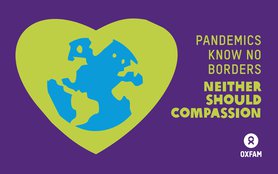In 1957, Ghana became the first nation in sub-Saharan Africa to achieve independence, thrusting aside British rule and starting the wave of decolonization that washed over the continent in the 1960s-’70s. Now a middle-income country known for its cacao, minerals, and oil exports, Ghana has made tremendous progress in reducing poverty in recent decades, but its success has been uneven. Significant inequalities still exist, especially between the south and the north, where the majority of the population lives on less than $1 a day. The COVID-19 pandemic has also had a major impact on the poorest people in the country.
With your help, Oxfam has been working alongside local organizations and allies in Ghana for 30 years to offer lifesaving support to people in times of crisis and to tackle inequality, poverty, and injustice. Our work to fight inequality includes assisting women entrepreneurs and farmers, advocating for transparent and equitable uses of export revenues for reducing poverty, and supporting organizations protecting the environment and human rights.








What challenges are people in Ghana facing?
35%
Percentage of women in Ghana who will experience some form of violence during their lifetime.
25.5%
Ghana poverty rate, estimated by the World Bank in 2020.
1,000
Number of millionaires created in Ghana from 2006 to 2016.